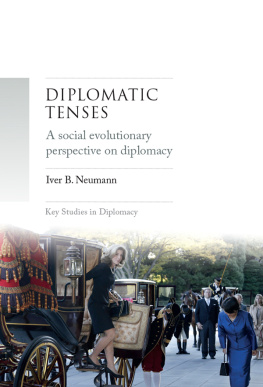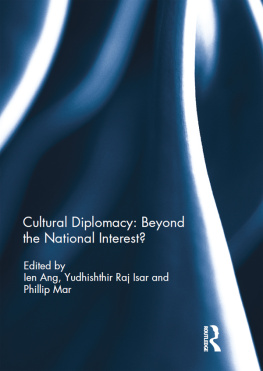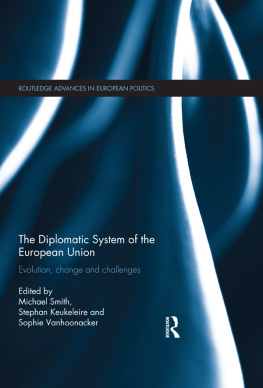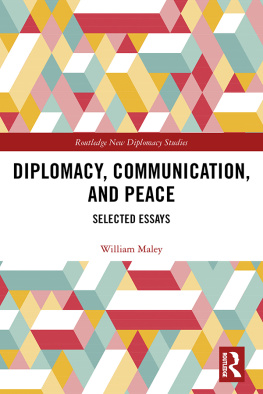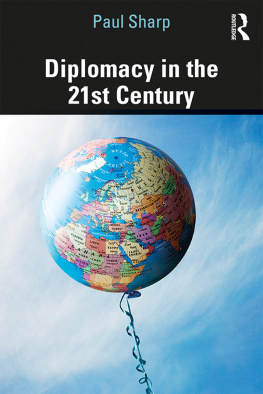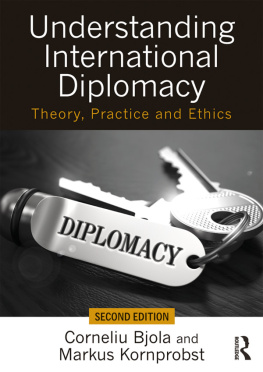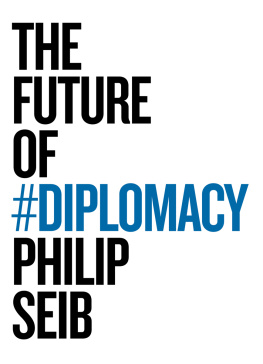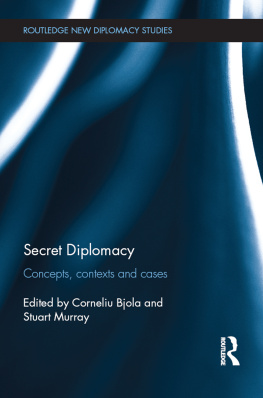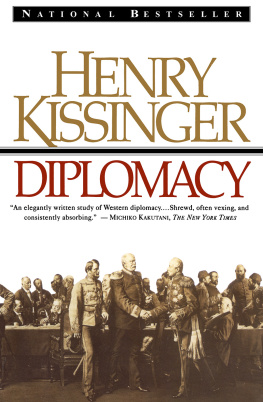Key Studies in Diplomacy
Series Editors: J. Simon Rofe and Giles Scott-Smith
Emeritus Editor: Lorna Lloyd
The volumes in this series seek to advance the study and understanding of diplomacy in its many forms. Diplomacy remains a vital component of global affairs, and it influences and is influenced by its environment and the context in which it is conducted. It is an activity of great relevance for International Studies, International History, and of course Diplomatic Studies. The series covers historical, conceptual, and practical studies of diplomacy.
Previously published by Bloomsbury:
21st Century Diplomacy: A Practitioners Guide by Kishan S. Rana
A Cornerstone of Modern Diplomacy: Britain and the Negotiation of the 1961 Vienna Convention on Diplomatic Relations by Kai Bruns
David Bruce and Diplomatic Practice: An American Ambassador in London, 19619
by John W. Young
Embassies in Armed Conflict by G.R. Berridge
Published by Manchester University Press:
Reasserting America in the 1970s edited by Hallvard Notaker, Giles Scott-Smith and David J. Snyder
Human rights and humanitarian diplomacy: Negotiating for human rights protection and humanitarian access by Kelly-Kate Pease
The diplomacy of decolonisation: America, Britain and the United Nations during the Congo crisis 196064 by Alanna OMalley
Sport and diplomacy: Games within games edited by J. Simon Rofe
The TransAtlantic reconsidered edited by Charlotte A. Lerg, Susanne Lachenicht and Michael Kimmage
Academic ambassadors, Pacific allies: Australia, America and the Fulbright Program by Alice Garner and Diane Kirkby
A precarious equilibrium: Human rights and dtente in Jimmy Carters Soviet policy by Umberto Tulli
US public diplomacy in socialist Yugoslavia, 195070: Soft culture, cold partners by Carla Konta
Israelpolitik: GermanIsraeli relations, 194969 by Lorena De Vita
Diplomatic tenses
A social evolutionary perspective on diplomacy
Iver B. Neumann
Manchester University Press
Copyright Iver B. Neumann 2020
The right of Iver B. Neumann to be identified as the author of this work has been asserted by him in accordance with the Copyright, Designs and Patents Act 1988.
Published by Manchester University Press
Altrincham Street, Manchester M1 7JA
www.manchesteruniversitypress.co.uk
British Library Cataloguing-in-Publication Data
A catalogue record for this book is available from the British Library
ISBN 978 1 5261 4871 1 hardback
First published 2020
The publisher has no responsibility for the persistence or accuracy of URLs for any external or third-party internet websites referred to in this book, and does not guarantee that any content on such websites is, or will remain, accurate or appropriate.
Cover image: US ambassador to Tokyo Caroline Kennedy arriving at the Imperial Palace in Tokyo, 19 November 2013 (AP Photo/Koji Sasahara)
Typeset by Newgen Publishing
To my comrades from the XIV Norwegian Army Language Course in Russian, 19781980, in and out of the Foreign Service: long may we run
Jaw jaw is better than war war
Winston Churchill
Contents
In the summer of 1980, I went to work as a guard and interpreter at the Norwegian embassy in Moscow. The work was my partial payment to the Norwegian Army for having taught me Russian. There was a guard at the gate, put there by our Soviet hosts, so the guarding basically consisted of sleeping on the premises at night and hoisting the flag in the morning. Then there was the interpreting, which turned out to be mostly translation that is, the work was written rather than verbal. I had ample time to watch diplomats at work, and to ponder the peculiarities of the Soviet Union in general, and its Ministry of Foreign Affairs in particular. One stood out: we were not allowed to travel more than 40 kilometres from the city centre without permission.
I returned from Moscow and went on to finish a doctorate on Russia. When the time came to pick a topic for my post-doc, I settled on diplomacy. My first book on the topic was an ethnography on discourse and practice: what do diplomats do, what do they say they do, and what is the difference between the two (Neumann ). Once one has committed to writing a book on space, a book on time follows logically. There is really only one way of finding out why my sometime Russian hosts insisted on restricting diplomatic travel from Moscow, and that is to trace the practice back in time. As it turns out, the practice is centuries old. When Russians began to host Western diplomats on a regular basis from the sixteenth century onwards, the visitors were met at the border, their coaches were draped so that they should not see their surroundings, and only then were they escorted to Moscow, where they were not allowed to move around unescorted.
As this example is meant to demonstrate, and given diplomacys world-historical ubiquity, there is a need for a book that discusses the emergence of diplomacy over the longue dure. Extant histories of diplomacy, which are without exception written from a Western perspective (e.g. Anderson ), tend to treat changes in diplomacy as something planned by states, which is of course perfectly legitimate. Such an approach should nonetheless be complemented by one that looks at the social institution of diplomacy as something that has emergent properties that is, that evolves as a result of ever-new changes. The past is definitely still with us. To take a leaf out of the phenomenologists book, when we take action, it is always informed by our past experiences, and also by our expectations about future events. Temporality that is, the way time appears to humans is a many-tensed affair.
There are three tenses in the English language: past, present and future. They are all in what a grammarian would call the realis mood, which means that they purport to state facts. It is a delightful part of human existence, however, that we do not In order to include what we may call the social imaginary of diplomacy, the book also offers a chapter on one of the ways in which diplomacy is imagined in a world of fiction that has had a very wide reception indeed, namely that of Harry Potter.
introduces the book by discussing how diplomacy is about handling the Other, noting how extant theoretical and historical approaches have conceptualized diplomacy, particularly in relation to other ways of dealing with the Other such as war, and stating how an evolutionary approach may complement extant approaches. These extant discussions of diplomacy understood as a social institution take the form of either histories or genealogies.
) idea of punctuated equilibria or tipping-points, understood as the culmination of long-term trends. Taking note of two tipping-points for human cooperation generally, namely big game hunting and classificatory kinship, I go on to identify four tipping-points for diplomacy. These are regular and ritualized contacts between culturally similar small-scale polities; regular and ritualized contacts between culturally different large-scale polities; permanent bilateral diplomacy; and permanent multilateral diplomacy. I round off by discussing what seems to be a trend on its way to become a new tipping-point, namely that states increasingly hybridize their diplomacy by working with and through non-state actors. This possible tipping-point comes in for more thorough scrutiny in the concluding chapter.

